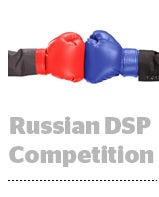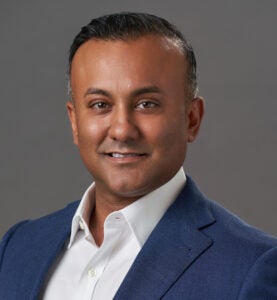 In Russia, programmatic and RTB practices are still in an early stage and make up less than 10% of the digital display advertising market.
In Russia, programmatic and RTB practices are still in an early stage and make up less than 10% of the digital display advertising market.
Yet despite that, or maybe because of it, demand-side platforms seem to be saturating the market – each seeking to distance itself from the competition.
“The market is getting new DSPs every month,” Vladimir Klimontovich, CTO of Russian DSP GetIntent, told AdExchanger. “Or, at least, new people claiming to have their own DSPs. But DSPs are also disappearing every month.”
With the constantly changing demand-side landscape in Russia, certain differences are starting to arise among DSPs. Does a vendor have local knowledge? Was the technology developed in-house? Is the vendor independent or connected to a holding company or agency?
“RTB has a small share and it isn’t always effective,” Klimontovich added, noting that many marketers don’t have enough money to properly invest in the technology. “Russian marketers care about KPIs and things like conversion rates. They are always asking what kind of technology you use and how effective it is.”
Technology
Russian RTB engineering startup IPONWEB has provided technology for several DSPs in Russia (as well as the US), and some say this has contributed to a regional ad tech sector that is crowded with too many players lacking differentiation.
“There are about 30 companies in Russia that are claiming that they are DSPs or they have one,” according to Dmitry Cheklov, CEO of DSP Targetix. “But most of them are connected with agencies and about 10 DSPs are independent.”
Not surprisingly, Cheklov counts his company as independent. He said Targetix built its own tech and is launching a self-service option called Hybrid.ru. Cheklov said Targetix’s main local competitors are HubRus, GetIntent and Segmento, which works with RuTarget for its DSP technology: “Our main difference from Russian competitors is that we work on our own technology stack that is a big data, ad predictor, dynamic optimization platform.”
One of Targetix’s clients, Tandem Advertising Group, emailed AdExchanger and explained how technology played a role in choosing Targetix as its DSP.
“There are lot of DSP companies in Russia, but we are constantly monitoring our advertising instruments,” said Nikita Danilin, a sales manager in the automobile advertising group. “Our point of view for advertising is all about effectiveness. If our instruments are not working, we will lose the trust of our clients.”
Local Expertise
The way a DSP connects with publishers and sell-side platforms (SSPs) in Russia can also hint at its strengths, said Michael Balakin, managing director of Sociomantic Russia. With local players Yandex, ADFOX, AdRiver and Between Digital as the sell-side leaders in Russia, not Facebook and Google, there is a level of local expertise and strong relationships necessary for DSP success.
“In order to cover all of the market and reach every user, we have to work with local SSPs, not only Google and Facebook,” Balakin said. “Sociomantic has a good relationship with the local supply-side platforms here, which is an advantage.” The language barrier can also be a challenge for international ad tech companies coming into the country; many need to hire smart, local teams to build the right relationships.
Sociomantic, which was acquired by dunnhumby earlier this year, has experience working in a variety of countries and has been in Russia since 2012.
Besides the language barrier, Balakin added, “what’s more important is the accounting procedures and rules. They are much more complicated than in Europe or the US. You have to have a local entity and work with customers in rubles if you want to be a significant player in the local market.”
But despite the challenges of entering such a closed market, Balakin sees the competition increasing from both local companies creating or partnering on their own DSPs and international companies moving into the country.
Small Vs. Large Brands
Ad tech companies in Russia tend to gravitate either to self-service options for smaller advertisers, or higher-end (read: managed service) solutions for large brands. Along with Targetix and its new self-service option, GetIntent’s Klimontovich also is leaning more toward self-service, where “the average check is small, but it’s a huge market.”
“We think every pizza shop owner should be able to advertise in his market with RTB,” Klimontovich said. “The job of a DSP is to provide the tools and the user interface. It’s the job of the agency to manage the campaign.”
Cheklov noted that Targetix’s Hybrid product is targeted at mass-market advertisers who have smaller budgets, even around $300. “We want to see and we will probably see more clients in Hybrid because it’s directed more for direct advertisers and it will be easier to scale that model to the international market,” he added.
Who will win?
But while each DSP has its own goals and strategy, it still remains to be seen what combination of technologies and tactics is best suited to this newer programmatic market.
“At this moment, many brand managers are aware of programmatic but they don’t want to run the risk, so when the big players are going into the space, they will play more in this space and ask for more,” Roman Nester, CEO at Segmento, told AdExchanger earlier this year,. “The market is really growing and I see the result of education and marketing activities of local and international players from the years before.”
Despite all the ways DSPs in Russia differ and try to distinguish themselves, programmatic and RTB is so data-driven that the technology will be the distinguishing factor in whether or not a company can grow and succeed in Russia.
“In Russia, in the next three years, it will be battle for the leadership in this segment of online advertisers in Russia,” Cheklov said.
And Balakin agreed: “At the end of the day, only a few players will survive, not only in Russia, but globally. It’s a war of machines and technology and those who have better technologies will survive.”














